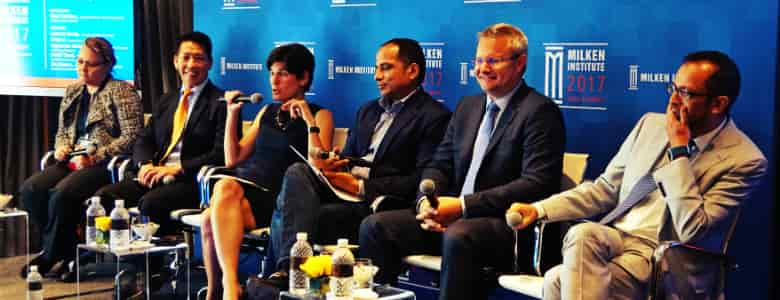Blockchain beyond cryptocurrencies

While the values of cryptocurrencies such as Bitcoin and Ethereum have been on a rollercoaster ride of late, the value of blockchains — the enabling technology upholding the existence of cryptocurrencies — is on a steady incline.
“There are more than 900 cryptocurrencies in the world, and initial coin offerings are kicking off all over the place. But we’re not going to talk about any of that today,” said Ms Staci Warden, Executive Director of the Centre for Financial Markets, Milken Institute.
She was moderating a panel discussion entitled ‘The Blockchain: It's Not All About the Money’ on 14 September at the Milken Institute Asia Summit 2017.
“Too many people are confusing cryptocurrencies with the underlying blockchain technology. This panel is about the incredible promise of blockchains beyond cryptocurrencies,” she added.
Sharing the stage with Ms Warden were Ms Leanne Kemp, Founder and CEO at Everledger; Mr Greg Li, Head of Asia at the Bitfury Group; Mr Sopnendu Mohanty, Chief Fintech Officer at the Monetary Authority of Singapore (MAS); Mr David Treat, Managing Director of Financial Services and Blockchain Lead at Accenture; and Mr Zia Zaman, Chief Innovation Officer at MetLife Asia.
The panellists, who represented a variety of economic sectors, shared compelling use cases for blockchains, and how the technology is being deployed in testbed or full-fledged initiatives.
Just do it
Known as an ‘immutable ledger’, blockchain technology is essentially a decentralised database stored on a 7,000-node global network.
Hence, any transaction logged on the blockchain becomes part of a permanent record that cannot be altered by any single party on the network.
Blockchains thus provide an unprecedented level of security and robustness that lends itself well to any process requiring trust.
Ironically, some institutions and enterprises may shy away from blockchain technology on the account that it is a relatively young innovation — the full benefits and risks of blockchains remain largely unexplored.
Nonetheless, the panelists felt that a fear of possible downsides should not be paralysing: In the context of imperfect knowledge, the best way forward would be to learn through experimentation.
“Regarding blockchains, MAS has adopted the stance of policymaking through experimentation,” said Mr Mohanty.
“Rather than writing a white paper, having a public consultation and putting up policy changes in three years, by which time the technology would have become irrelevant or far bigger than we could understand, we thought that we’d experiment.”
This thinking was shared by the Bitfury Group’s Mr Li.
“The biggest challenge in implementing blockchain is getting people to understand what it is. So instead of spending hours explaining blockchain, let’s just jump straight into a pilot study,” he said.
But even a pilot study must have a purpose or solve a problem, and Mr Zaman of MetLife said that one way to create value from blockchains is to “start thinking about the customer instead of the technology”.
“We hear that the customer needs are: protect my assets, protect my identity and protect something about me,” said Mr Zaman.
“The question that we should then ask is: how can we reduce friction in the customer’s journey?”
Winning by twinning
No matter the industry, leveraging blockchains involves the concept of a digital representation of a physical object, agreed the panelists.
“If we’re able to take a digital thumbprint of objects and effectively mark them in the blockchain, it would help solve some of the problems of fraud; how documents concerning proof of ownership and proof of value are being tampered with and doctored,” said Ms Kemp of Everledger.
(Editor: Everledger is a startup that uses bitcoin blockchain technology for fraud prevention, for high-value items like diamonds.)
Extending this idea of ‘digital twinning’ to land ownership, Mr Li highlighted that blockchains present a way to create a backup of land titling records.
This prevents the loss of critical information during disasters, such as the earthquake in Haiti which destroyed nearly all paper-based documentation.
“So, what we’ve done in the Republic of Georgia is put the whole land titling system on the blockchain. This is not a pilot project, it is in full production,” he said.
But perhaps most revolutionary is the possibility of placing human identity on blockchains.
This is what Accenture is attempting to achieve with its partners, such as Microsoft.
“A digital identity has to be definitively associated with the human, so one of the first realisations was that we should be putting biometrics and blockchains together,” said Mr Treat.
He noted that in addition to being exclusively personal, a digital identity has to be portable, private and persistent. Hence, blockchains are an ideal platform to host personal information.
Given the slow but certain maturation of blockchain technology, the panelists concurred that the day would come when people would not need to fully understand blockchains to be able to benefit from them.
“How many of us actually know how the internet works?” asked Mr Mohanty.
“We depend on it daily, but the way it functions is mostly obscure to us. I think blockchains will eventually get to the same point.”


